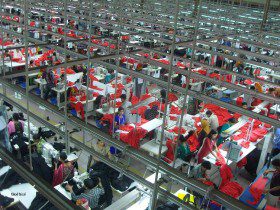By Fauzia Erfan Ahmed, Associate Professor, Sociology and Women’s Studies, Miami University, Ohio, Research Affiliate, South Asia Institute, Harvard University
The vast scholarship on gender and globalization highlights the woman garment factory worker: her problems; and the ways in which she must struggle to overcome them. But few studies focus on how these women, in fact, form the lowest segment of the globalized commodity chain of the apparel industry. The author argues that, therefore, a comprehensive solution, to women workers’ voice, rights, and workplace safety, lies beyond the shop floor. Scholars also need to study up. Men and women, in higher chain segments, such as factory owners and buyers, should be investigated because they produce and reproduce power relations or governance through the globalized chain.
Based on a pilot study of women garment factory owners and workers conducted in July 2013, in the aftermath of the Rana Plaza disaster, this paper presents two primary stages in such an inquiry. First, it presents an analytic framework of gender, governance, and labor, which includes all levels of the global value chain: workers; factory owners; buyers; and consumers. The theoretical approach combines literatures on globalization and the feminization of labor, the globalized commodity chain framework, and the exit-loyalty-voice model. This nexus is the analytic prism, which refracts hypotheses at each level of the chain. Second, the paper presents three testable hypotheses. 1. If, factory owners have more voice in the relationship with the buyer, working conditions can improve for women workers. 2. Factory owners, who are affiliated with the women’s NGOs, are willing to give women workers voice. 3. Factory owners, who have developed a feminist consciousness, utilize the moral argument to try to improve conditions in their factories and in the garment sector as a whole.
In conclusion, the author states that Rana Plaza is a dialectical moment of local change in the global economy. Scholars need to explore the possibilities of a moral economy and meanings of feminist governance within the globalized commodity chain. As a first step, they should utilize the ethical argument to challenge the basis of the trade-off between the right to work and the right to decent working conditions for the woman garment factory worker.
Click here to read the full paper.
The SAI Research Affiliates Program is an opportunity for researchers and faculty to use Harvard’s resources for their research. Research Affiliates will contribute to the academic study of South Asia on campus by bringing their expertise on a wide range of issues to the University.

